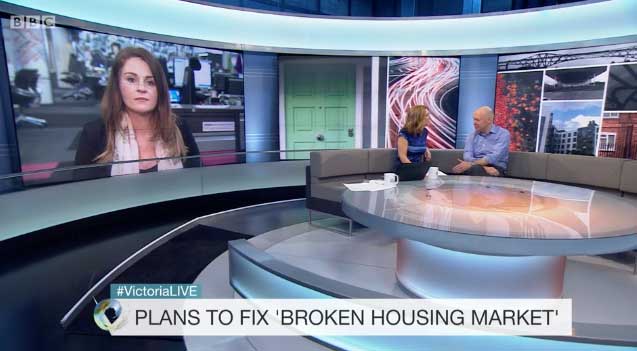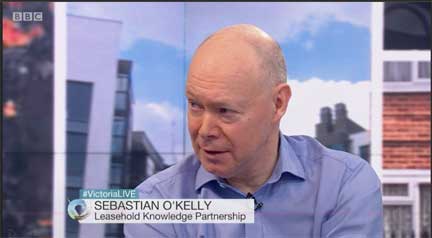
Shady speculators in UK property assets including residential freeholds were raised on the BBC TV’s Victoria Derbyshire show yesterday.
It can be viewed here at 1:44
Sebastian O’Kelly, of LKP, said in an interview: “We are told that residential freeholds are bought by pension funds and that it pays for your and my pensions.
“Absolute rubbish. Many of the them have been sold to shady companies where the ownership is hidden by nominee directors, or they are owned offshore.
“It is this speculative element that has got to end in British property.”
The programme was a long preview of the Housing White Paper and followed an excellent, thorough report on the Victoria Derbyshire show considering leasehold generally last week at 14:56 and 01:07:20.
It included an interview with Clair Scott, owner of a Taylor Wimpey leasehold house in Silver Birch Close, in Bolton, which has doubling ground rents every ten years which started at £295.
Ms Scott and her partner had been trying to sell her property, but the sale fell through.
“The sale was going really well,” she told Victoria Derbyshire. “But then it fell through at the last minute because the buyer’s solicitors came across the ground rent clause.
“Basically it says we pay £295 a year but then it doubles every 10 years until it gets too £9,440 by 2060.
“The solicitors told the buyers that our house was not sellable because the ground rent terms were too onerous.
“We have inquired about purchasing the freehold from an entity but we don’t really know who is behind it – we don’t know who owns our freehold.
“The cheapest offer we have got it to at the moment is £40,000.
“Either way you look at it we have lost 25% of the value of our house.”
The position is even worse for Clair as she is heavily pregnant and she and her partner have completed the purchase of another house.
“So we are financially crippled and riddled with worry.”
 Mr O’Kelly agreed with Victoria Derbyshire that the situation was scandalous.
Mr O’Kelly agreed with Victoria Derbyshire that the situation was scandalous.
“It is a complete scandal. And the pity of it is that this is plc housebuilders which are misselling these leasehold houses. A total of 8,775 were sold in 2015.
“Hapless first time buyers are coming off assured short-term tenancies and buying these houses only to find there are these onerous ground rent terms that completely devalue the property.
“Many of them have bought with solicitors recommended by the developers. I cannot stress strongly enough: do not ever employ a solicitor recommended by the developer. That in itself is a disqualification.
“The Help To Buy scheme, where taxpayers are underwriting people’s mortgages, could be used to end these flawed, predatory products.”





 Affluent London leaseholders are just as likely to be kicked around as poor ones, finds the Sunday Times
Affluent London leaseholders are just as likely to be kicked around as poor ones, finds the Sunday Times






















I really don’t understand this “off shore” freeholder shenanigans. I mean it’s bricks & mortar, why is it legal to have this loophole! The last two. managing agents company’s were also registered ‘off shore’ and so was the scaffolding company used for major works. Practically everyone was registered ‘off shore’.
The scaffolding company?!
Please let us know more.
Admin,
I believe the scaffolding company were probably POLES!
Our case is actually with FTT I will send you the details once we have the verdict..
Are the leaseholders subject to these onerous leases actually being helped by the ‘White Paper’?
I sincerely hope so, but I very much doubt anything will actually happen in the near future – perhaps I am being pessimistic.
To my mind the simple (simplistic?) solution is to immediately make all residential ground rent reviews capped to a maximum of, say, £350… (or £550 for London or other high property price areas) this would then solve:
1) Devalued properties: If the Ground Rent is no longer a big issue, homes can be bought and sold again at market values.
2) The high cost of for residents to extend the lease extensions of their flats: If Ground Rent is no longer bumping up the investment value of the flat’s lease by a massive amount then the cost to extend the lease would go back to acceptable levels.
3) The high cost for residents to buy the freehold of their leasehold houses: Again if Ground Rent is no longer bumping up the investment value of the house’s lease, buying the freehold would become a much more acceptable cost.
4) The incentive to developers selling freehold to third parties: If the Ground Rent investment is worth much less, they won’t be in such a hurry to sell the freeholds to investment Companies. In fact they may stop bothering and make these particular houses built (not flats of course) freehold in the first place.
Who would lose out? I guess the investment companies will lose out big time and might get nasty… and the developers who haven’t sold some freeholds yet will lose a bit too. Maybe the developer will lose even more as the investment companies demand compensation from them?
I’m sure I’ve missed something obvious, but this just seems like the easy thing to do… is such a Ground Rent cap even legally possible by the govt?
Probably not when you think their basis the Commonhold Leasehold Reform Act 2002. I would propose clarifying the difference between Leaseholders and Tenants as this is what has become open to abuse over the years Re; s.112 – have a read it’s not good. Personally I scrap that Act.
With these doubling GR’s and one High St. Lender puling out perhaps this could be the straw that broke the camels back. What’s next a new form of Negative Equity for Leaseholders? This should go viral as this will bottom out the market. If people can’t sell the property then I foresee a mass exodus of Borrowers throwing keys back at the Lender. This then would lead to a swathe of Flats/Houses on the market that no-one will buy unless they are only renting them out. Then the Lender will only be able to rent out and the have the further headache of who owns what where 2nd and 3rd Charges have been placed too. Good times!